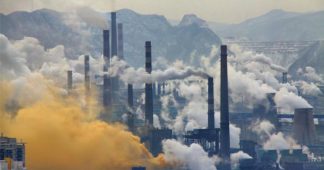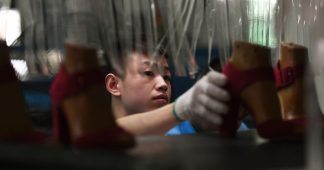H&M and Zara have just been linked to devastating pollution in Asia. The clothes many Europeans love to buy and wear are made with fabrics from factories that dump untreated, toxic water directly into rivers and streams [1]. And while they say they are concerned, they haven’t committed to stop sourcing from these deadly factories if the pollution continues. It’s up to us to demand they act now.
Investigators who visited these factories knew straight away that something was seriously wrong. Water quality tests and conversations with locals confirmed the truth. These factories are devastating local environments and communities. The worst thing is, it doesn’t have to be this way. Clean production technologies already exist and could be widely implemented, if brands like H&M and Zara demanded them.
H&M and Zara have responded to public pressure before to change their practices. After all they depend on all of us to buy their clothes — or not. These companies are already getting slammed in the media, and now we need to hit them where it hurts — their customer base. If tens of thousands of us strike them with our messages they will have to acknowledge us.
The factories implicated are huge — they include ten of the biggest global factories in the fabric supply chain and spread across China, India and Indonesia. And companies like H&M and Zara are some of their biggest customers. If they demanded changes, the factories would have to act.
The fabric involved is called viscose, a plant-based fibre that’s an increasingly popular alternative to cotton or synthetic products. It’s often pitched to consumers as a more “sustainable” option — and it could be. But the viscose that H&M and Zara are buying is anything but sustainable. It’s the result of a hugely chemical intensive process with no real environmental controls. That means dangerous chemicals and noxious gases released into the environment way in excess of recommended levels.
At factory after factory, workers and local residents told investigators stories of sick friends and family, undrinkable water, and devastated fisheries. Residents at one factory in China said that they didn’t even dare to feed the dead fish to their pigs due to the levels of contamination. Water quality tests confirmed these stories, often finding pollutants far in excess of the weak legal limits that do exist.
This is entirely within our power to change. H&M and Zara are already sensitive to the media coverage this campaign has received. Now, they need to hear from us. It’s worked before — when thousands of workers died in Bangladesh producing clothes for fashion giants, H&M and Zara signed a landmark accord following consumer pressure.
If we across Europe demand a change, then H&M and Zara will have to listen. And together, these huge companies have the power to get the factories to stop their pollution. All that’s missing is our pressure to get it to happen.
You can sign the petition here










